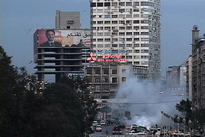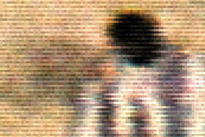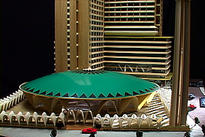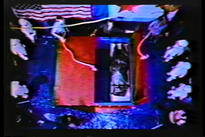JULIA MELTZER & DAVID THORNE
ÉCRAN D'ART - SCREENING
The American art duo Julia Meltzer and David Thorne produce video works, photography, installations, and publish writings. Their projects focus on potential ways in which visions of the future are conceived, claimed, and realized, specifically in the context of religion and global politics. This double programme presents two of their recent works which shift between hard facts, personal accounts, and poetic reflections.
It’s not my memory of it: three recollected documents
2003, 25’, colour, English
In this work the artists raise questions concerning the ‘logic’ of the bureaucracy surrounding secrecy in the present climate of heightened security control. An ex-CIA informer recounts the story of his disappearance based on destroyed secret documents which were accurately reconstructed by radical fundamental students in 1979 Iran. A film shot by the CIA in 1974, but which surfaced only in 1982, documents the burial at sea of six Soviet sailors; a ceremony which, in honouring the dead, nullifies the contradictions of the Cold War. Images of a publicly known but top secret United States rocket strike in Yemen in 2002 lead to a final reflection on the role of documents in the covert dynamics that exist between knowing and not knowing.
It’s not my memory of it: three recollected documents intercuts these three historical documents with fragments of interviews with information control officials of various federal agencies. Making a distinction between ‘real’ secrets and the ones valid for ‘protocol’ only, they explain what it means to neither confirm nor deny the existence of certain documents, and clarify the process of separating secret from public information.
We will live to see these things, or, five pictures of what may come to pass
2007, 47’, colour, English
Shot in 2005-06 in the Syrian capital Damascus, the five sequences of this essayistic documentary present contradictory perspectives on an uncertain future. What can happen in a place where people live in the tension area defined by a repressive regime, a growing conservative Muslim movement, and ongoing and severe pressure by the United States?
Meltzer and Thorne successively present a chronicle of an unfinished building in the centre of the city, a mantra predicting the coming of a perfect leader, the discourse of a dissident intellectual, and an impression of a Koran school for young girls. Ending in poetic and hypothetical visions of the ‘new world’, the images of We will live to see these things, or, five pictures of what may come to pass open a wide interpretative field, with a soundtrack reminiscent of thriller films.
It’s not my memory of it: three recollected documents
2003, 25’, colour, English
In this work the artists raise questions concerning the ‘logic’ of the bureaucracy surrounding secrecy in the present climate of heightened security control. An ex-CIA informer recounts the story of his disappearance based on destroyed secret documents which were accurately reconstructed by radical fundamental students in 1979 Iran. A film shot by the CIA in 1974, but which surfaced only in 1982, documents the burial at sea of six Soviet sailors; a ceremony which, in honouring the dead, nullifies the contradictions of the Cold War. Images of a publicly known but top secret United States rocket strike in Yemen in 2002 lead to a final reflection on the role of documents in the covert dynamics that exist between knowing and not knowing.
It’s not my memory of it: three recollected documents intercuts these three historical documents with fragments of interviews with information control officials of various federal agencies. Making a distinction between ‘real’ secrets and the ones valid for ‘protocol’ only, they explain what it means to neither confirm nor deny the existence of certain documents, and clarify the process of separating secret from public information.
We will live to see these things, or, five pictures of what may come to pass
2007, 47’, colour, English
Shot in 2005-06 in the Syrian capital Damascus, the five sequences of this essayistic documentary present contradictory perspectives on an uncertain future. What can happen in a place where people live in the tension area defined by a repressive regime, a growing conservative Muslim movement, and ongoing and severe pressure by the United States?
Meltzer and Thorne successively present a chronicle of an unfinished building in the centre of the city, a mantra predicting the coming of a perfect leader, the discourse of a dissident intellectual, and an impression of a Koran school for young girls. Ending in poetic and hypothetical visions of the ‘new world’, the images of We will live to see these things, or, five pictures of what may come to pass open a wide interpretative field, with a soundtrack reminiscent of thriller films.




-
Thu 13.11.2008
21:30 - 21:30 -
Practical info
Location:
Cinéma Arenberg
Koninginnegalerij 26 Galerie de la Reine
1000 Brussels
Entrance Fee:
8 / 6,6 Euro - Artists
- Works